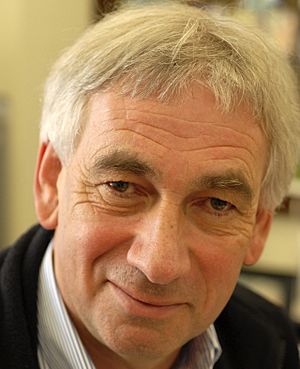Richard Ellis (astronomer) facts for kids
Quick facts for kids
Richard Ellis
|
|
|---|---|

Ellis in 2008
|
|
| Born |
Richard Salisbury Ellis
25 May 1950 Colwyn Bay, Wales UK
|
| Nationality | British |
| Alma mater | University College London University of Oxford |
| Awards | Fellow Royal Society 1995 Bakerian Lecture 1998 Fellow Institute of Physics 1998 CBE 2008 Gold Medal of the Royal Astronomical Society 2011 Breakthrough Prize in Fundamental Physics (shared) 2014 Carl Sagan Memorial Prize (shared) 2017 Fellow & Corresponding Member, Australian Academy of Science 2018 Honorary Doctorate (D.Sc.) Edinburgh University 2019 Michael Faraday Medal and Prize 2020 Royal Society Royal Medal 2022 Gruber Prize in Cosmology (sole recipient) 2023 International Member National Academy of Sciences 2024 Honorary Doctorate (D.Univ.) University of Surrey 2024 |
| Scientific career | |
| Fields | Astronomy |
| Institutions | University College London (2015–present) Caltech (1999–2015) University of Cambridge (1993–1999) Durham University (1974–1993) |
| Thesis | Stellar abundances and nucleosynthesis (1974) |
| Doctoral advisor | Donald Blackwell |
| Doctoral students |
See list
|
Richard Salisbury Ellis, born on May 25, 1950, is a famous astronomer from Wales. He is currently a professor of Astrophysics at University College London. Before this, he was a professor at the California Institute of Technology (Caltech). He has won many important awards for his work, including the Gold Medal of the Royal Astronomical Society in 2011, the Royal Medal in 2022, and the Gruber Prize in Cosmology in 2023.
Contents
Studying the Stars
Richard Ellis studied astronomy at University College London. He then earned his advanced degree, called a DPhil, from the University of Oxford in 1974.
Career in Astronomy
Early Career and Professorships
In 1985, Richard Ellis became a professor at the Durham University in England. He spent two years at the Royal Greenwich Observatory during this time. In 1993, he moved to the University of Cambridge. There, he became the Plumian Professor of Astronomy and Experimental Philosophy. He also became a fellow at Magdalene College.
From 1994 to 1999, he was the director of the Institute of Astronomy, Cambridge. After that, he moved to Caltech in the United States.
Leading Observatories
Soon after arriving at Caltech, Richard Ellis became the director of the Palomar Observatory. He later reorganized it into the Caltech Optical Observatories. This change was important because Caltech was becoming more involved with the Thirty Meter Telescope.
After 16 years at Caltech, he returned to Europe in September 2015. He received a special grant from the European Research Council. This allowed him to continue his research at University College London (UCL).
Research and Discoveries
Richard Ellis mainly studies observational cosmology. This means he uses telescopes to look at the universe. He explores how galaxies form and change over time. He also studies how large structures in the universe develop. Another area of his research is understanding dark matter, which is a mysterious substance in the universe.
He worked on a project called the Morphs collaboration. This project studied how distant galaxies formed and what they looked like. He is also very interested in using gravitational lensing. This is when gravity from massive objects bends light, acting like a giant magnifying glass. He also studies high-redshift supernovae, which are exploding stars very far away.
Richard Ellis was part of the Supernova Cosmology Project. The leader of this project, Saul Perlmutter, won the 2011 Nobel Prize for Physics. This team made the surprising discovery that the universe is expanding faster and faster.
His most recent discoveries involve searching for the earliest known galaxies. These galaxies are so far away that we see them as they were when the universe was very young. They appeared when the universe was only a small fraction of its current age.
The Thirty Meter Telescope
While at Caltech, Richard Ellis was the director of the Palomar Observatory from 2000 to 2005. He played a big part in planning the Thirty Meter Telescope. This is a huge project involving Caltech, the University of California, Canada, Japan, China, and India. The telescope is planned to be built on Mauna Kea, Hawaii. If it is built, it will be the largest ground-based optical and near-infrared telescope in the northern hemisphere.
Awards and Recognition
Richard Ellis has received many honors for his contributions to astronomy:
- He became a Fellow of the Royal Society in 1995.
- He was made a Commander of the Order of the British Empire (CBE) in 2008.
- He became a Fellow and Corresponding Member of the Australian Academy of Science in 2018.
- In 2024, he became an International Member of the US National Academy of Sciences.
 | Madam C. J. Walker |
 | Janet Emerson Bashen |
 | Annie Turnbo Malone |
 | Maggie L. Walker |

